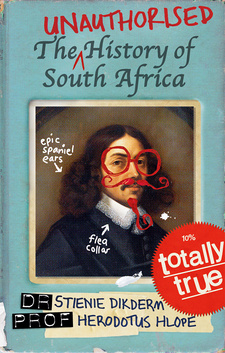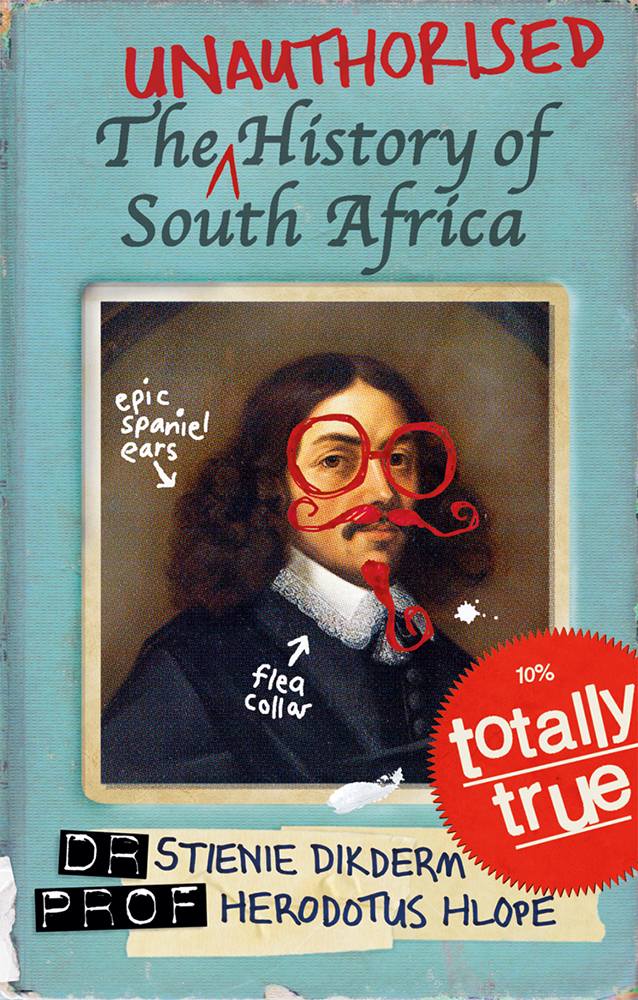Unauthorised history of South Africa, by Stienie Dikderm and Herodotus Hlope

Unauthorised history of South Africa, by Stienie Dikderm and Herodotus Hlope. Penguin Random House South Africa, Zebra Press, Cape Town 2013. ISBN 9781770225947 / ISBN 978-1-77022-594-7
Nota: A wedgie, as mentioned in the following excerpt from Stienie Dikderm's and Herodotus Hlope's history book, Unauthorised history of South Africa, is the act of forcibly pulling a person's underwear upwards from the back. The act is a school prank or a form of bullying, and as old as there has been underwear.
First In, last Out
For many south Africans, the history of the First People seems very complicated; it is, in fact, very simple. Four or five thousand years ago, southern Africa was home to the San, the Bushmen, the Khoikhoi and the Khoisan. The San were sometimes Bushmen, except when they were Khoisan, while the Khoikhoi lived in the Bush but were not always Bushmen. The San and Bushmen often hunted in desert areas, where there was less Bush and more San-d, but not exclusively, or neither, or both, unless they intermarried with the Khoi. However some were too coy to marry Khoi. In other words, much less confusing than we thought. The Bushmen and San were hunter-gatherers. This was a big improvement on their first attempt at a society, when they decided to be gatherer-hunters: hunting gatherers was fun and relatively easy (the gatherers just squatted on the ground, putting roots in a sack, and were easy to track and shoot with poisoned arrows), but soon all the gatherers were extinct and the hunters realised that they would have to start doing the gathering themselves. And so the hunters announced to their womenfolk that from now on men would hunt and women would gather. This meant that women would spend all day gathering roots, berries, bark, eggs and water while men would go off and hunt for the nearest shade tree and spend the rest of the day sitting discussing how awesome the new hunter-gatherer society was. When the women became suspicious, the men would catch two hundred mice, skin them, mash their tiny carcasses together and carry the heap of meat back to camp before announcing that they had killed a mighty eland after chasing it for ten days across the desert. The women saw straight through this ruse, but mouse meat was easier to digest than eland and so they said nothing. Of course, from time to time the hunters did manage to bag a big kill. Archaeologists agree that it was the San who invented fast food when X!# the Very Short-Sighted of the Xu clan accidentally shot a cheetah, which promptly sprinted into a veld fire and was flash-fried. If hunters managed to bring down an eland, they would honour it with prayers of thanks. If they had chased the eland for two days and it got away, however, they would honour it with swearwords, describing it as 'that X$$#ing stinking hairy piece of X:!' before giving ceremonial wedgies to their leader who had suggested they try to shoot an eland instead of bagging two hundred mice as usual. The ceremonial San wedgie was a ferocious punishment, as leather thongs were unforgiving underpants. Such confrontations, however, were rare. The First People of South Africa were largely peaceful. Conflict was resolved by discussion, negotiation, bartering and, only in extreme cases, ceremonial wedgies. Our modern concept of private ownership was unknown to them: everything was shared, including gastroenteritis from sharing the same water bottle. There were limits to this peace, however: in 1323 bc, when Kxa the Lecherous suggested that they start sharing wives, he was given a wedgie and forced to share a water bottle with X!t: the Siff. [...]
This is an excerpt from the 'Unauthorised history of South Africa', by Stienie Dikderm and Herodotus Hlope.
Title: Unauthorised history of South Africa
Author: Dr Stienie Dikderm; Prof. Herodotus Hlope
Genre: History
Publisher: Penguin Random House South Africa
Imprint: Zebra Press
Cape Town, South Africa, 2013
ISBN 9781770225947 / ISBN 978-1-77022-594-7
Softcover, 14 x 21 cm, 198 pages
Dikderm, Dr Stienie und Hlope, Prof. Herodotus im Namibiana-Buchangebot
Unauthorised history of South Africa
The hilarious 'Unauthorised History of South Africa' tells you the history you always wanted to know but were too afraid to ask.

